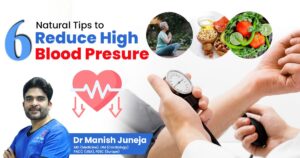If you are suffering from high blood pressure, so there is a natural tip to reduce high blood pressure. A frequent illness that raises the risk of heart disease, stroke, and other health issues is high blood pressure, sometimes known as hypertension.
However, lifestyle changes play a vital role in treating high blood pressure. Controlling blood pressure with a healthy lifestyle might prevent, delay or lessen the need for medicine.

How is a diagnosis of high blood pressure made?
Usually, high blood pressure doesn’t cause any symptoms. Therefore, routine blood pressure checks from your healthcare professional are the only method to determine whether you have it. A blood pressure cuff, a stethoscope or electronic sensor, and a gauge will all be used by your healthcare professional. Before reaching a diagnosis, they will take two or more readings at different appointments:
| Category | Systolic Blood Pressure | Diastolic Blood Pressure |
| Normal | Less than 120 | Less than 80 |
| Elevated | Less than 120 – 129 | Less than 80 |
| High Blood Pressure Stage 1 | Less than 130 – 139 | Less than 80 – 89 |
| High Blood Pressure Stage 2 | Less than 140 or higher | 90 or higher |
| Hypertensive Crisis | Higher than 180 | Higher than 120 |
Here are 6 natural tips to reduce your blood pressure
1. Reduce excess weight
One of the best methods to manage blood pressure is to lose weight. If you have excess fat so must increase the chances of high blood pressure. During sleep, facing a disturbance in breathing is a symptom of the disorder. Millimetres of mercury (mm Hg) are used to measure blood pressure. Generally speaking, each kilogram (2.2 pounds) of weight decrease may result in a blood pressure drop of roughly 1 mm Hg.
2. Engage in regular exercise
Regular exercise helps to prevent from increasing high blood pressure. Generally, you must try to do at least 30 minutes of moderate exercises each day. It help people with hypertension lower their blood pressure to safer levels. Some activities including walking, jogging, cycling, swimming, and dancing can all help reduce blood pressure.
Blood pressure can also be lowered by strength training. At least two days a week should be dedicated to strength training activities. Consult a healthcare provider about starting an exercise regimen.
Read Also: Best exercise for heart patients
3. Consume a healthy diet
A diet low in saturated fat and cholesterol and high in fruits, vegetables, whole grains, and low-fat dairy products can reduce high blood pressure by as much as 11 mm Hg. The Mediterranean diet and the Dietary Approaches to Stop Hypertension (DASH) diet are two dietary regimens that can help lower blood pressure.
Dietary potassium can reduce the blood pressure-lowering effects of sodium and table salt. To give processed goods a salty flavour, food manufacturers frequently add sodium. Try to consume 3,500–5,000 mg of potassium daily. Blood pressure may drop by 4 to 5 mm Hg as a result. Find out from your doctor how much potassium you should consume.

4. Reduce back on sodium and salt in your diet
Blood pressure and heart health can be improved by consuming even a small amount less sodium. The impact of sodium on blood pressure differs for different populations. Limit your daily sodium intake to 2,300 mg or less. However, limiting sodium intake to 1,500 mg or less per day is preferable for the majority of adults. By doing so, high blood pressure may drop by roughly 5 to 6 mm Hg.
5. Limit alcohol intake
Blood pressure can be lowered by around 4 mm Hg by limiting alcohol consumption to less than one drink per day for women and two drinks per day for males. Twelve fluid ounces of beer, five ounces of wine, or one and a half ounces of 80-proof liquor make up one drink.
However, excessive alcohol use can elevate blood pressure in some ways. Additionally, it may reduce the effectiveness of blood pressure medications.
6. Quit smoking
Blood pressure rises during smoking. Blood pressure can be lowered by quitting smoking. Additionally, it can enhance general health and reduce the risk of heart disease, thereby resulting in a longer lifespan.
7. Take a good night’s sleep
Weeks of sleep deprivation of less than seven hours per night may contribute to hypertension. Sleep disorders such as sleep apnea, restless legs syndrome, and insomnia, or general insomnia, can interfere with sleep.
Aim for 7 to 9 hours of sleep each night as an adult. If you frequently have problems falling asleep, let your healthcare provider know. Sleep quality can be enhanced by identifying and addressing the problem. Use these easy ways to get more comfortable sleep if you don’t have sleep apnea or restless legs syndrome.
Conclusion
These natural tips to reduce your blood pressure include stress reduction, regular exercise, a nutritious diet, and lifestyle modifications. Your blood pressure and general health can significantly improve with these easy, long-lasting practices. Before making big adjustments to your lifestyle, always get medical advice.

